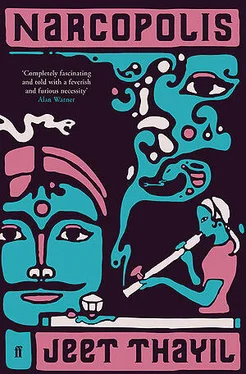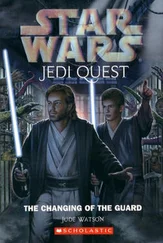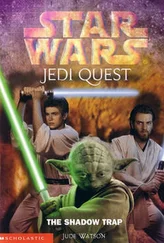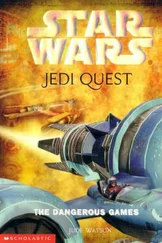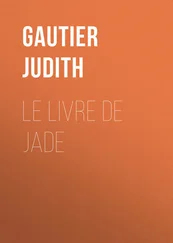Chapter Five ‘Dum Maro Dum’
Rashid took her out one day. He said he wanted to do what poor people do, eat the air on Chowpatty, eat the air and drink the breeze and enjoy. She thought to herself, such a filmi dialogue. But she liked the mood-setting tone of the words and she put on a black-and-white chiffon polka-dot that was the happiest thing she owned. They took a taxi to the beach and kept it waiting while they strolled on the sand. Rashid lit a cigarette from a pack of Triple Fives and from the butt he lit another. He smoked the entire time they were on the beach, not more than twenty minutes, and then he wanted to stop somewhere for a drink, he said, get some Scotch or Honeydew brandy, good for you, no, a drop of brandy? She suggested a lassi instead. They went to Rajasthan Lassi but chikkus were out of season. The lassi was so thick it was like ice cream, only better, and served in a glass, with a spoon that stood upright in the thick cream. They sat in the back of the cab and had two each, one after the other, and the taxi driver had one too. Then they went to Opera House to watch Rashid’s all-time number-one favourite movie, Hare Krishna, Hare Ram . It was at least ten years old, no need to wait in line and buy tickets in black. He’d seen it many times and knew the words of all the songs and long exchanges of dialogue that he said aloud, usually Dev Anand’s bits, though he disliked the actor.
‘He’s a chooth, look at him, flopping around like a faggot.’
His favourite song was ‘Dum Maro Dum’, in which a bunch of home-grown hippies smoked endless chillums and the lead actress lip-synced to Asha Bhosle’s voice, Asha sounding like she’d been up three nights straight, smoking too much opium and drinking dirty whisky. Dimple liked it too, the stoned lilt of it.
Duniya ne hum ko diya kya?
Duniya se hum ne liya kya?
Hum sub ki parva kare kyun?
Sub ne humara kiya kya?
The song stayed in her head for days, but the message meant nothing to her. All she saw was a group of rich kids smoking charas in the mountains. She saw their beauty and she heard their laughter. They didn’t work and yet they had plenty of money and friends and fashionable clothes and families who worried about them. Why were they so full of self-pity? What were they rebelling against? Why didn’t they just admit it, that they liked to get high?
*
She didn’t get it, but she knew why Hare Krishna, Hare Ram was Rashid’s favourite movie: Zeenat Aman, the bronze-skinned mini-skirted actress he’d named her after. She was everywhere, on movie posters, on billboards two storeys high. She was on the cover of Stardust magazine, smiling like she knew a secret no one else did: she knew why you were standing there with the magazine in your hands, gazing at her image with awe, maybe, or desire mixed with dazzlement. The magazine had its own name for her, Zeenie Baby. There were gossipy items about Zeenie’s boyfriends in London, New York and Bombay, about the grasping mother who managed her career and love life. The magazine had names for its articles: tear-jerkers, exclusive scoops, bombshell exposés. She read — fast, very fast; though sometimes she said a sentence aloud to get the sense of it — about Zeenie’s love for her father, a writer who died young, and she looked at pictures of the modest homes Zeenie grew up in and glamorous stills from the movies that had made her famous. She’s pure romance, thought Dimple, like Meena Kumari and Madhubala and Begum Akhtar, the female legends beloved of eunuchs, prostitutes and poets.
Rashid took her to a beauty parlour in Colaba, where he asked the hairdresser to straighten her hair. Make it fall like a curtain, like Zeenat’s, see here, he said, pointing to Stardust. It took hours of work with a hot iron, sitting in a chair reading a magazine, music on the radio, Lata, who else, singing ‘Yeh Mausam’. But afterwards she had a taste of what it was to be Zeenie, beautiful, famous, desired by everyone, the thing that happened when she took a walk on the street on some routine chore, and the men turned to stare, or they followed her, or attempted to start a conversation, any conversation, as if she were emitting some kind of bio-radar, some hormone ray that magnetized male animals. A Spaniard at the khana called the actress Zeenat A Man — he had to explain the joke — because he said there was something drag-queen glamorous about her. She was making his second pipe when the man said: You look like her.
‘You’re the fourth person who said that.’
‘The fourth person today?’ He was smiling.
She said, ‘No, not today. But I’m prettier.’
He said, ‘Much, much.’
It wasn’t true, not at all, but she could pretend.
*
Dimple, sitting in the movie theatre with Rashid, looked up at Zeenie’s moon-like face, her round milk-white face that had absorbed every injustice in the world, and Dimple wished for a sister, an older sister she could talk to. The theatre was very cold: cold air was blowing in from the sides, and she wished she’d brought a shawl. It was the AC, Rashid said. What is AC? she asked. He said something in reply, something she forgot instantly, because she was watching the screen so carefully. Zeenie was playing a woman who runs away from a broken home and renames herself Janice. When she and her brother meet as adults she cannot remember him.
janice’s brother (trying to jog her memory): Look at this flower. You used to like flowers.
(Janice accepts the flower and smiles a smile of such sweetness you know, if you’re at all knowledgeable about such things, that she will die very soon.)
janice: Beauty is in the mind, in the eyes.
(They are among a crowd of flower children. Someone passes Janice a chillum and she takes an impossible, elegant puff and hands it to her brother, though she doesn’t know him yet.)
janice’s brother: No, I have a cough.
janice (scolding): If you want to sit with us, be like us. Joy, intoxication, peace, these are the things we believe in. Do you believe in joy?
janice’s brother: Is it only by smoking that you can believe in joy?
(Rashid knew the line and didn’t think much of it. He shouted it out anyway, only slightly out of sync with Dev Anand, laughing thickly as he mimicked the actor. A man sitting ahead of them turned to say something, took a look at Rashid and changed his mind.)
janice’s brother: Are you happy? Janice, are you happy?
(Janice is quiet for a time, a light in her eyes, an ancient light like the light from a long dead moon, and when she speaks it is in a whisper, and everybody in the theatre leans forward to hear.)
janice: Yes, I’ve never been so happy. It’s good to run away from home when nobody needs you and you have so much love to share with the world.
*
Dimple imagined Janice was talking only to her, ignoring the others in the theatre and tilting her moon face so her beautiful dying eyes were looking into Dimple’s. She wished Rashid had named her Janice instead of Zeenat, Janice, who didn’t remember her mother or father, who was strumming a guitar, saying: Oh I know this song, it’s on the tip of my tongue, make me another chillum and I’ll remember. What is this song? So high she was like an alien from a glorious superior species. And later, lying on the grass, lost, mountains around her, this lovely girl looks at the audience and says: Parents, why do they have us? A moment of pleasure and they’re saddled for life. They don’t really want us.
Dimple understood the exact nature of Janice’s suffering. To know you were unloved by your parents, it was a wound that would never heal. Nothing Dimple did to forget her early life could change this fundamental fact. She was always under the sway of it. It never went away. She’d think she was okay, but she wasn’t. If she wasn’t sleeping enough or if she was anxious, it would catch up with her, as fresh and wet and red as it had ever been. In the scene when brother and sister are finally reunited in a village in Kathmandu, Dimple made no effort to hide her tears. Others were crying too, men and women, entire families weeping together as they munched their popcorn and sucked noisily at bottles of Thums Up and Fanta.
Читать дальше
